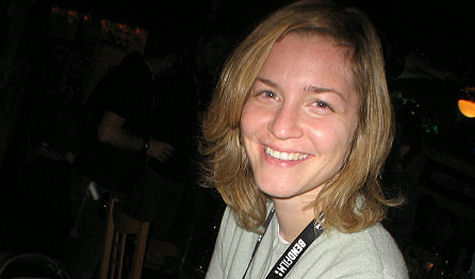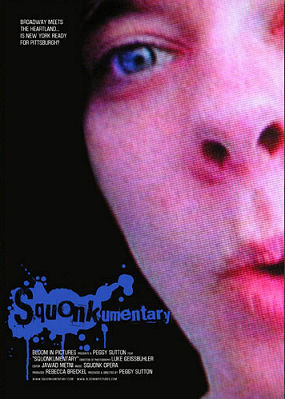All Squonked Out
Life is hard all over, day after day, but every time I visit a film festival I’m reminded how especially hard it seems for documentary filmmakers. How so many of them go into deep debt to get their films made, and how most find that it takes three or four or five years to finish. And if they don’t manage to win awards at film festivals it’s that much harder to land a DVD distribution deal because awards are regarded as selling points.

Filmmaker and script supervisor Peggy Sutton
There’s the personal satisfaction of making a film you’re happy wth, of course, plus the calling-card benefit that always helps when you’re starting your next film and looking to get the best people and/or cut the best deals. There’s the general heartwarm that comes from hearing positive reactions when your film plays before festival audiences (who tend to be generous) and all that, but for every Werner Herzog, Ken Burns or Michael Moore there are hundreds if not thousands of doc makers who reap almost no reward for their efforts, and who wouldn’t be able to stay in the game without superhuman tenacity.
Case in point: Peggy Sutton, a Manhattan-based script supervisor, and director of SQUONKumentary, a culture-clash doc about a group of Pittsburgh musicians who encounter some rough and tumble as they prepare their musical revue for a Broad- way venue. It’s an engaging, well-made piece — quirky, spirited — and I presume it’s been shown here and there since its completion sometime in late ’05. But I was nursing a feeling yesterday that Sutton might exemplify the thankless plight of the documentary filmmaker a bit more than others.
< ?php include ('/home/hollyw9/public_html/wired'); ?>
I spoke to Sutton last night about what she went through to get it made, but it was a bit noisy and everyone was drinking. I called with more questions this morning, twice, but she didn’t call back. (Probably thought I was trying to hit on her.) She’s probably shown SQUONKumentary at this and that festival, but all I know for sure besides the fact that it played here yesterday morning is what the IMDB says, which is that it showed it at the AFM (American Film Market) in September ’05.
The Bend Film Festival showing happened Friday at 11 a.m. at the Regal Old Mill, in the southern part of town. A more opportune venue would have been the Tower theatre on Wall Street, and a better time would have been in the late afternoon or evening. Obviously the festival wouldn’t be showing SQUONKumentary if they weren’t fans, but they seem to be slightly bigger fans of the some of the other films.

I shouldn’t be saying anything before tonight’s awards ceremony, but I can repeat that the jurors for the Bend Film Festival awards (myself among them) met yesterday and that SQUONKumentary, naturally, was one of the docs we talked overand weighed. I can’t say anything more except the obvious, which is that the competition at any well-regarded festival (and Bend definitely qualifies) is always tough.
And I was thinking as I spoke to Sutton last night…it’s hard to say it just so, especially under constrictions. But I came away from the jury deliberations with a keener appreciation for what filmmakers go through.
The performers — SQUONKers — in Sutton’s film are formally known as the Squonk Opera company, from Pittsburgh.
Sutton got to know them when she was hired to film two performances during Squonk Opera’s seven-week engagement on Broadway in 2000. They want clips to use for TV reviews and for distribution to European theatre producers.
“I was struck by them as people and as artists,” Sutton told a Pittsburgh Tribune writer in November 2005. “Theirs is not a conventional show. There’s no narrative. It doesn’t have a book or an overarching story. They think of themselves as a band first, with six members. There are visual elements and audience participation in their shows.”
Sutton’s performance footage became the core of her documentary film.
“I started editing in January 2005, which shows you how long the evolution was. I’ve been told the average time for a documentary is five years. You’re condensing lives into a three-act struggle.”
Sutton told me last night that it cost about $100,000 (I think); the IMDB says it cost about $150,000. “Are you in debt,” I asked her. “No,” she said. Obviously there’s a story there, but like I said…

SQUONKumentary shot in Manhattan, Brooklyn and Pittsburgh. The idea of beginning work on a project in 2000 and not finishing it for another four or five years sounds like a mind-blower to me. How does filmmaker “keep it up” all those years? I would think you’d get sick of the subject after a couple of years, or certainly by the third year. But four or five? Gimme a break.
Sutton’s income as a script supervisor has given her a relatively comfortable life. She’s worked on mostly indie-level films — Tape, Pollock, Election, Lawn Dogs, Songcatcher, Chasing Amy — as well as Stuart Little 2, Ash Wednesday and Men in Black 2.
